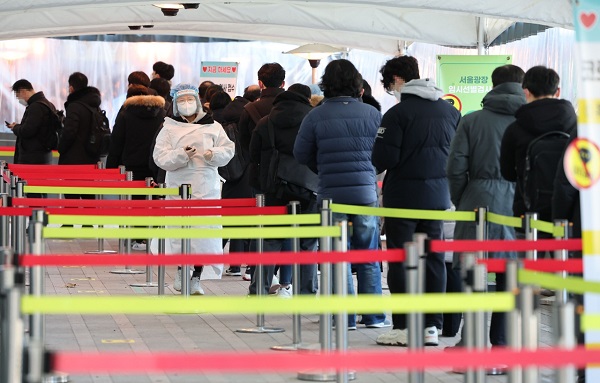
Seoul, (Asian independent) South Korea’s daily coronavirus cases jumped to over 5,000 for the first time in 20 days on Wednesday amid growing concerns over the spread of the omicron virus variant ahead of the Lunar New Year holiday.
The country added 5,805 new Covid-19 infections, including 5,431 local infections, raising the total caseload to 705,902, Yonhap news agency reported, citing the figures released by the Korea Disease Control and Prevention Agency (KDCA).
The daily caseload had stayed below 5,000 since December 30, when it stood at 5,034.
The number of critically ill Covid-19 patients stood at 532 on Wednesday. The country reported 74 Covid-19 deaths, raising the death toll to 6,452. The fatality rate was 0.91 per cent.
The number of imported cases was tallied at 374, bringing the total imported cases to 22,304.
The hike in daily cases came a day after the KDCA lifted the vaccine pass program at several kinds of multiuse facilities, including department stores, large discount stores, cinemas and cram schools, across the country.
Still, the vaccine pass scheme will remain in effect at such facilities as cafes, restaurants, nightclubs, indoor gyms, karaoke establishments, internet cafes and public bathhouses, the public health agency said.
The program requires people to present proof of Covid-19 vaccination or negative test results when entering multiuse facilities. It has been in effect since November when the number of daily infections soared to nearly 8,000.
On Monday, the government raised the limit on the size of private gatherings to six from the previous four. But it extended a 9 p.m. curfew on restaurants and cafes, which has been in place since mid-December, for another three weeks until February 6.
The move came amid deepening worries over a drastic upsurge in infections, as the highly transmissible omicron variant has spread at a fast pace and many people are expected to travel for family reunions during the Lunar New Year holiday that begins later this month.
As of Wednesday, 43.63 million people, or 85 per cent of the country’s 52 million population, have been fully vaccinated, and 24 million, or 46.8 per cent, have received booster shots, the KDCA said.







